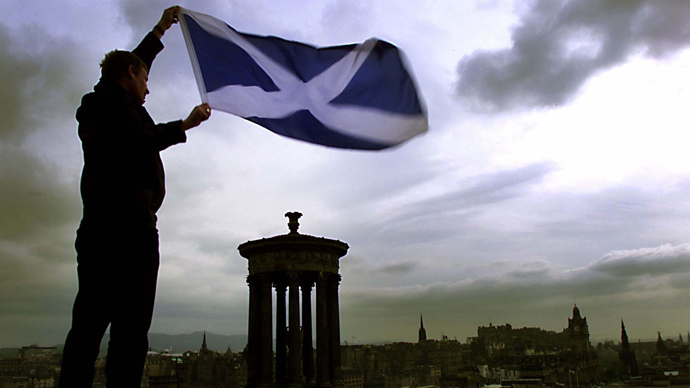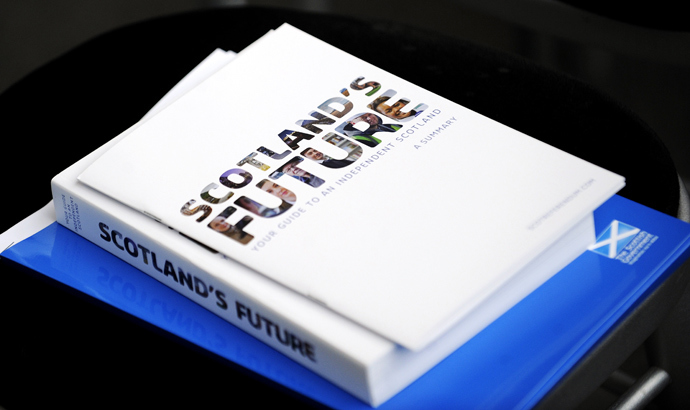Scotland’s proposed independence ‘is without independence’

The idea that you can forge a social democratic utopia, as set out in the Scottish government's white paper, in an economy that continues to operate in the same neoliberal economic reality is flawed at inception.
The much anticipated white paper on Scottish independence was given its official launch at a news conference in Glasgow this week by the devolved Scottish Government, represented by First Minister, Alex Salmond, and Deputy First Minister, Nicola Sturgeon of the Scottish National Party (SNP).
The importance of the document – which is close to 700 pages long – was reflected in the size of the media presence at the event. Over 200 journalists gathered to listen to Salmond’s and Sturgeon’s joint presentation of what is their vision of an independent Scotland with the referendum now less than a year away, and to ply both politicians with questions.
Up to this point the issue has yet to catch the imagination of the majority of Scots. More worryingly for Alex Salmond, the SNP, and the Yes Campaign, the most recent opinion poll, conducted on behalf of The Sunday Times, places support for Scottish independence at 38% with 47% against and a further 15% undecided.
Clearly, pro independence supporters and campaigners will be hoping for an upsurge in support on the back of the release of this document, which goes by the title Scotland’s Future.
Despite the lack of popular interest in the issue as yet, this will no doubt change as we move closer to the referendum on 18 September 2014. It is the most important constitutional issue facing the people of Scotland, and by extension the rest of the UK, since the Act of Union brought the United Kingdom into existence in 1707.
The white paper setting out the Scottish government’s vision for full independence is a vision of a progressive alternative to the status quo. On issues such as the economy, wealth redistribution, social justice, the environment and nuclear weapons, the argument in favour of independence would appear to be a no brainer.
However bridging the gap between the vision and the reality necessarily involves a leap of faith; and it is here where the Yes campaign has its biggest mountain to climb in inspiring the Scottish people to take the leap with them.

The key issues that have emerged in the course of the debate on Scottish independence revolve around Scotland’s future membership of the EU as an accession state, the formation of a sterling area that will enable Scotland to retain sterling as its currency going forward, and its ability to act on its pledge to get rid of Trident nuclear missiles from Scottish soil and still be accepted as a member of NATO.
Alex Salmond averred at the launch in Glasgow that sterling is not an English currency it is a UK currency, therefore Scotland has the right to adopt it as its own national currency should the Scottish people vote for independence. The flaw in this argument is instantly apparent. If Scotland does become independent then by definition it leaves the UK, which means that sterling would indeed become a foreign currency. If - and at this point it does remain a question of if – if Westminster were to accept the Scottish Government’s plan for the creation of a sterling zone it means that Scotland’s interest rates would be set by the Bank of England. The former Prime Minister Gordon Brown has recently described this state of affairs as “self imposed colonialism”, a claim which on the surface seems hard to dispute.
When it comes to EU membership, the SNP are arguing that Scotland could join without adopting the euro. Alex Salmond has cited Sweden as an example of how this could work in practice. Regardless, it remains as yet unclear whether an independent Scotland would be able to forge the same status within the EU as Sweden, especially in light of an economic crisis which at the time of writing shows little evidence of abating throughout the eurozone. It is also worth noting that Sweden held a referendum on the issue of joining the euro, with the Swedish people voting not to. Does Salmond envisage holding a referendum on the euro in Scotland? It remains unclear.
What is also unclear is what an independent Scottish Government would do in the event that their attempt to retain sterling as the Scottish currency as part of a sterling zone is refused by Westminster. What is the proposed alternative in that case? At present there is none, which seems staggering given that as yet there has been no guarantee or clarification with regard to an independent Scotland being able to retain sterling.
Finally, the Trident nuclear submarine facility at the Clyde Naval Base in Scotland is a NATO as well as UK asset. It is difficult to envisage the scenario under which NATO would do anything other than make their retention at their present location a condition of Scotland’s admission as a member state. Call me a cynic but it just seems unrealistic to see this happening, as envisaged by Alex Salmond and the SNP.

Moreover, NATO is a military alliance which since the end of the Cold War has switched its function to the projection of imperial power, engaged in military adventures in places such as the former Yugoslavia and most recently Libya, for example. Would the Scottish people be comfortable being a member state of such a military alliance and how does this square with the boast of Yes campaigners that independence constitutes a progressive alternative to the status quo?
The SNP also envisages the British monarchy continuing as the Scottish head of state. With this feudal and anti-democratic institution acting as the constitutional lynchpin of the existing British state, how can its retention as Scotland’s head of state be considered independence? It simply cannot.
On the economy, the SNP pledges that if it is elected as the first government of a newly independent in Scotland that the minimum wage will increase to keep pace with inflation at the same time as there will be no tax rises. This seems more like the product of magical thinking than economic reality. It is more likely that in order to attract investment Scottish workers will be entered into a race to the bottom with their counterparts in what remains of the United Kingdom. Neoliberalism makes it so. Any foreign investor looking to set up a business in the UK will go where wages and production costs are lowest.
On this and the other issues set out above it is clear that what the SNP is advocating is independence without independence. The idea that you can forge a social democratic utopia, as set out in their white paper, in an economy that continues to operate according to neoliberal norms is flawed at inception. You can decide to ignore the weather in winter and go out for a stroll in shorts and a t-shirt, but the weather won’t ignore you. The same logic applies when it comes to denying the reality of neoliberalism.
Despite the best efforts of the more progressive Radical Independence Campaign, the SNP’s vision is the one that is dominating the debate. Indeed, in the hearts and minds of the vast majority of Scottish people the SNP and Scottish independence constitute two sides of the same coin.
No doubt the arguments for and against Scottish independence will sharpen and feature heavily throughout Scotland and the rest of the UK in the months to come.
I for one remain unconvinced by the arguments put forth by the SNP. On issue after issue their argument in favour of independence is based on assumptions that cannot be substantiated. The Scottish people will need more than this to be persuaded to embark on the most profound and far reaching constitutional change in over 300 years.
The statements, views and opinions expressed in this column are solely those of the author and do not necessarily represent those of RT.
The statements, views and opinions expressed in this column are solely those of the author and do not necessarily represent those of RT.













